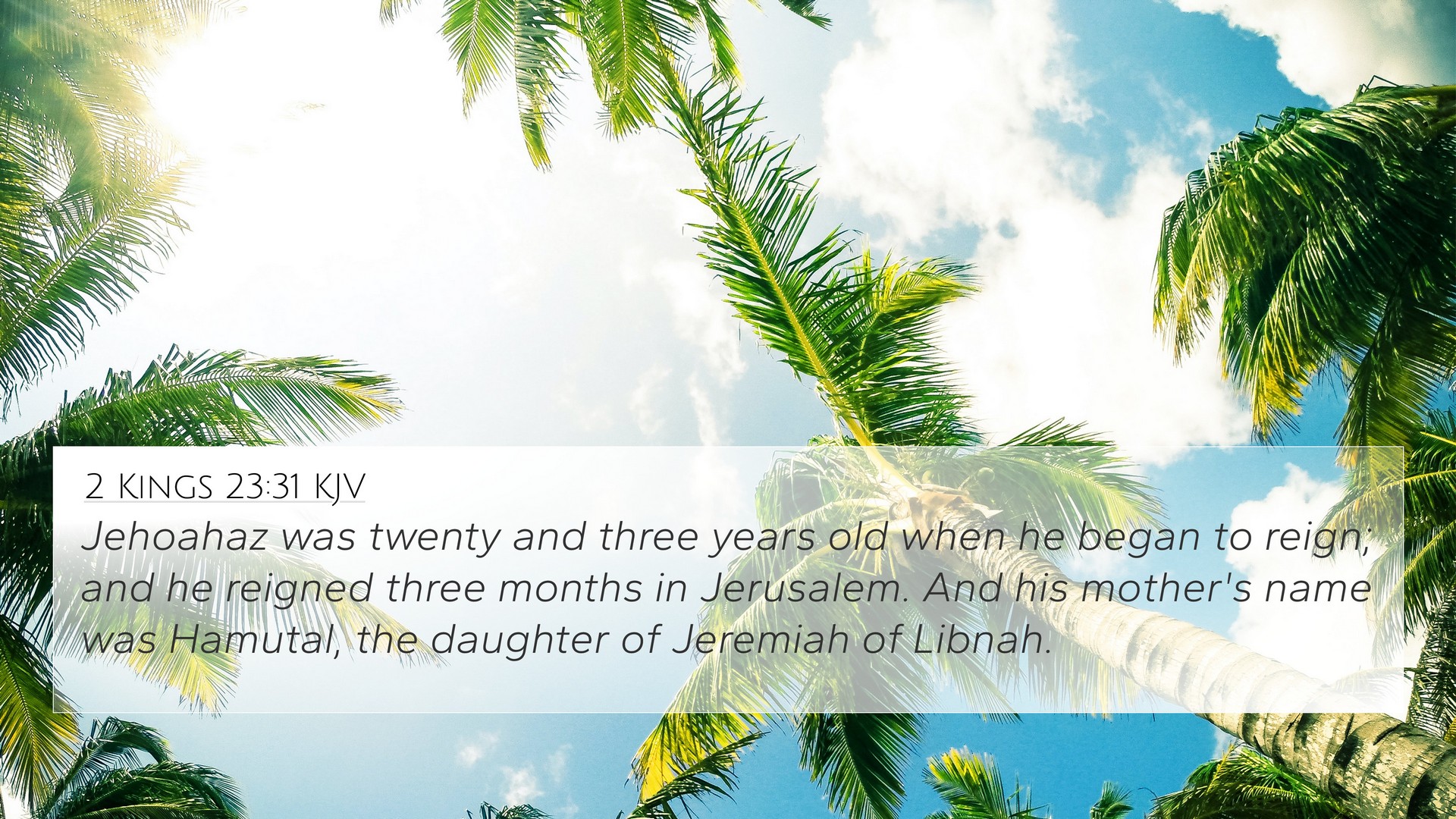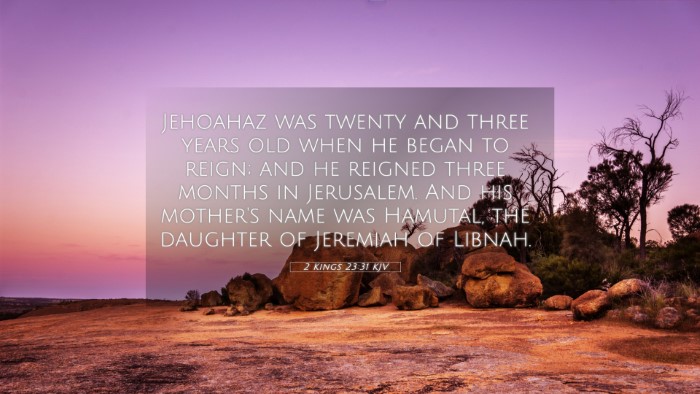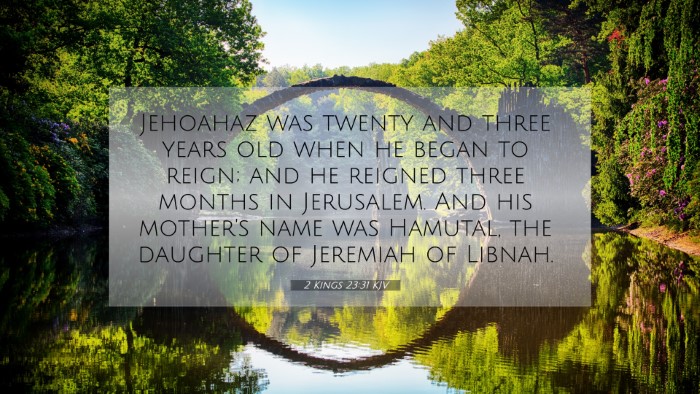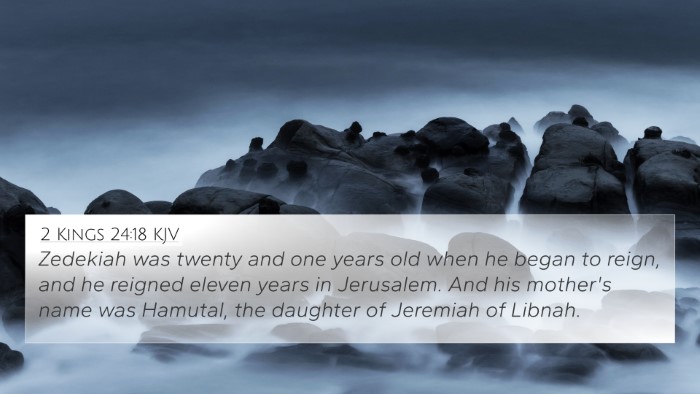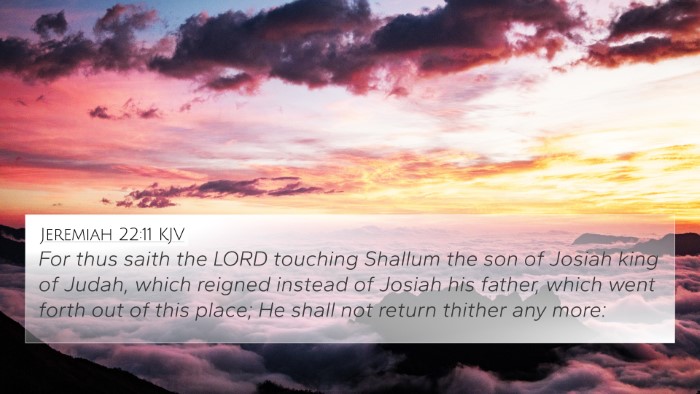Understanding 2 Kings 23:31
The verse 2 Kings 23:31 states: "Jehoahaz was twenty-three years old when he began to reign, and he reigned three months in Jerusalem. His mother's name was Hamutal the daughter of Jeremiah of Libnah."
Summary of Key Themes
- Leadership and Legacy: This verse provides a glimpse into the life of Jehoahaz, a king of Judah whose brief reign is indicative of the tumultuous historical context of the period.
- Parental Influence: Mention of Jehoahaz's mother highlights the impact of family lineage and maternal influence in shaping the character and actions of leaders.
- Age and Experience: Jehoahaz’s young age at the start of his reign raises questions about his capabilities and the dynamics of power within the kingdom during this time.
Commentary Insights
Matthew Henry: In his commentary, Henry emphasizes the fleeting nature of Jehoahaz’s rule, symbolizing the instability that characterized Judah's monarchy during this era. He points out that despite being in a position of authority, Jehoahaz failed to lead his nation towards righteousness, echoing the themes of rebellion and judgment prevalent in the historical narrative.
Albert Barnes: Barnes highlights the significance of Jehoahaz’s short reign, suggesting that it reflects God's judgment upon Judah. His commentary illustrates how the young king's decisions were influenced by the corrupt practices of his predecessors, aligning with the overarching theme of moral and spiritual decay in Israel's leadership.
Adam Clarke: Clarke discusses the historical context surrounding Jehoahaz's reign, noting the political instability faced by Judah. He suggests that Jehoahaz's ascension to the throne, marked by his youth and inexperience, made the kingdom vulnerable to external pressures and internal strife.
Cross-References to Other Bible Verses
To deepen the understanding of 2 Kings 23:31, here are some relevant cross-references:
- 2 Kings 21:19: The mention of another young king, emphasizing generational continuity and the challenges of leadership in Judah.
- 2 Chronicles 36:1-4: Provides further context about the political environment in which Jehoahaz operated.
- Jeremiah 22:10-12: Foretells the fate of the royal line, linking to Jehoahaz's lineage and foreshadowing subsequent tragedies.
- 1 Kings 14:21-31: Discusses the deteriorating spiritual state of Judah, illustrating the broader implications of weak leadership.
- 2 Kings 24:8: Further insight into the consequences of poor kingship, showing the pattern of kings in succession.
- 2 Kings 23:36-37: Details the nature of Jehoahaz's leadership and the difficulties that arose in Judah as a result.
- Exodus 20:5-6: Highlights the importance of parental influence and the generational consequences of sin, applicable to Jehoahaz and his family.
Thematic Connections Across Scripture
This verse and its implications open avenues for thematic connections throughout the Bible, showcasing the intricate tapestry of leadership, morality, and divine judgment. These themes resonate in various biblical narratives:
- Understanding the dynamics of family influence in leadership, as seen with the kings of Israel and Judah.
- Exploration of judgment and mercy associated with God’s response to the actions of kings.
- Comparative analyses of leadership traits by contrasting other biblical kings, like Josiah and Hezekiah.
- Intersecting prophetic warnings that precede the leadership of Judah's kings.
Methods for Cross-Referencing Biblical Texts
For those interested in studying Bible verse connections, employing a structured Bible cross-reference system can be beneficial. Here are some methods:
- Bible Concordance: Use it to locate keywords and find simultaneous usages throughout the scripture.
- Bible Study Guides: Utilize specialized guides that focus on cross-referenced themes and topics.
- Digital Tools: Take advantage of online Bible study platforms that allow you to view parallel verses and related scriptures.
- Comparative Studies: Engage with books or resources that present detailed analyses of associated texts, such as the Gospels and the Old Testament.
Conclusion
In summation, 2 Kings 23:31 serves as a vital piece in understanding the historical and spiritual fabric of Judah during a time of great upheaval. By examining this verse alongside relevant commentaries and cross-references, we gain insights not only into Jehoahaz’s reign but also into the broader themes of leadership, consequence, and divine judgment. This approach promotes a thorough and enriched understanding of the Scriptures.
